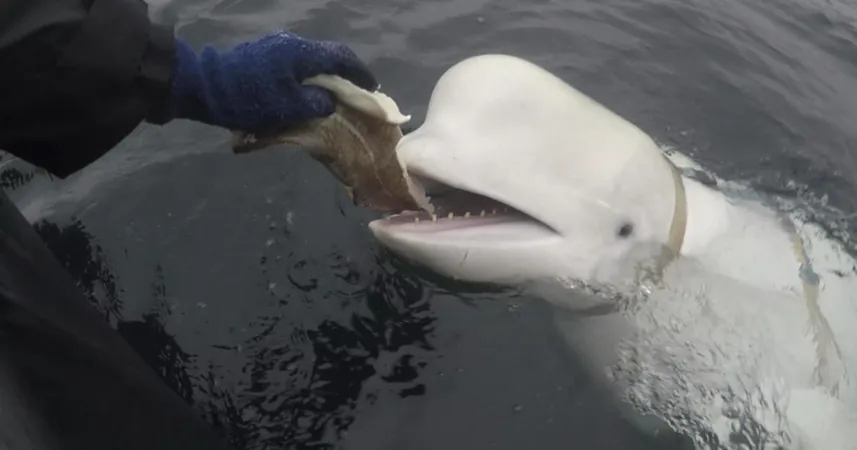
Shocking Truth Behind the Death of Norway's "Spy Whale" Uncovered!
2024-10-04
Author: Yan
A beluga whale nicknamed "Hvaldimir," which stirred global intrigue with its harness reportedly labeled "Equipment St. Petersburg," has been confirmed by Norwegian police not to have been shot, as some animal rights groups had claimed. Instead, it tragically succumbed to a bacterial infection, marking a sad end to a life filled with speculation and mystery.
The final autopsy conducted by Norway's Veterinary Institute revealed that the probable cause of death was a bacterial infection likely stemming from a wound in its mouth caused by a foreign object. Amund Preede Revheim, the head of the North Sea and Environment section of the police, emphasized that there was no evidence of gunshot injuries. He revealed that the autopsy was challenging due to the poor condition of the whale's organs, which had significantly deteriorated.
Hvaldimir was first spotted in 2019 near Russian waters, sparking rumors that it might have been used by the Russian military for espionage, as it bore a harness that suggested military origins. It was discovered floating in a southern Norwegian bay on August 31, shortly after animal advocacy groups filed a police report claiming the whale’s injuries indicated foul play. They pointed to several wounds on its body, including a supposed bullet hole.
However, the forensic analysis debunked these theories, asserting that specific marks on the whale were not due to gunfire. Medical examinations, including X-rays, failed to uncover any projectiles. Additionally, officials found a stick measuring about 35 centimeters (14 inches) lodged in the whale’s mouth, which may have contributed to its infection. Alarmingly, the whale's stomach was empty at the time of discovery, indicating a struggle for survival.
Initially sighted by fishermen near Hammerfest, the 4.2-meter (14-foot) beluga weighed 1,225 kilograms (2,700 pounds) and captured the imagination of many as "the spy whale." This notion became a media sensation, especially given Russia's alleged experimentation with marine mammals for military purposes. Reports suggest that the Russian military has previously attempted to train dolphins for combat roles, further feeding into the narrative of Hvaldimir as a potential intelligence asset.
Despite the controversy surrounding its presence in Norwegian waters, Moscow has remained silent on the speculation connecting Hvaldimir to espionage efforts. With animal advocacy groups like OneWhale and NOAH still concerned over the circumstances of the whale's demise, it seems that the story of Hvaldimir will linger in the public consciousness—an enigmatic symbol of the intersection between nature, warfare, and the unknown machinations of international relations.
This heart-wrenching tale combines elements of wildlife conservation, military intrigue, and the fragility of life in our oceans, prompting many to think deeply about the treatment of marine animals and the impact of human activities on their ecosystem. The fate of Hvaldimir serves as a reminder of the delicate balance between humanity and nature.


 Brasil (PT)
Brasil (PT)
 Canada (EN)
Canada (EN)
 Chile (ES)
Chile (ES)
 España (ES)
España (ES)
 France (FR)
France (FR)
 Hong Kong (EN)
Hong Kong (EN)
 Italia (IT)
Italia (IT)
 日本 (JA)
日本 (JA)
 Magyarország (HU)
Magyarország (HU)
 Norge (NO)
Norge (NO)
 Polska (PL)
Polska (PL)
 Schweiz (DE)
Schweiz (DE)
 Singapore (EN)
Singapore (EN)
 Sverige (SV)
Sverige (SV)
 Suomi (FI)
Suomi (FI)
 Türkiye (TR)
Türkiye (TR)